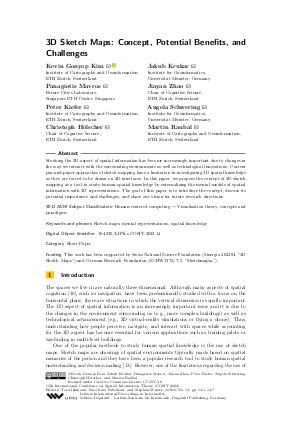3D Sketch Maps: Concept, Potential Benefits, and Challenges (Short Paper)
Authors
Kevin Gonyop Kim  ,
Jakub Krukar,
Panagiotis Mavros,
Jiayan Zhao,
Peter Kiefer,
Angela Schwering,
Christoph Hölscher,
Martin Raubal
,
Jakub Krukar,
Panagiotis Mavros,
Jiayan Zhao,
Peter Kiefer,
Angela Schwering,
Christoph Hölscher,
Martin Raubal
-
Part of:
Volume:
15th International Conference on Spatial Information Theory (COSIT 2022)
Part of: Series: Leibniz International Proceedings in Informatics (LIPIcs)
Part of: Conference: Conference on Spatial Information Theory (COSIT) - License:
 Creative Commons Attribution 4.0 International license
Creative Commons Attribution 4.0 International license
- Publication Date: 2022-08-22
File

PDF
LIPIcs.COSIT.2022.14.pdf
- Filesize: 0.58 MB
- 7 pages
Document Identifiers
Subject Classification
ACM Subject Classification
- Human-centered computing → Visualization theory, concepts and paradigms
Keywords
- Sketch maps
- mental representations
- spatial knowledge
Metrics
- Access Statistics
-
Total Accesses (updated on a weekly basis)
0Document
0Metadata
Abstract
Studying the 3D aspect of spatial information has become increasingly important due to changes in the way we interact with the surrounding environments as well as technological innovations. Current pen-and-paper approaches of sketch mapping have a limitation in investigating 3D spatial knowledge as they are forced to be drawn on 2D interfaces. In this paper, we propose the concept of 3D sketch mapping as a tool to study human spatial knowledge by externalizing the mental models of spatial information with 3D representations. The goal of this paper is to introduce the concept, discuss its potential importance and challenges, and share our vision for future research directions.
Cite As Get BibTex
Kevin Gonyop Kim, Jakub Krukar, Panagiotis Mavros, Jiayan Zhao, Peter Kiefer, Angela Schwering, Christoph Hölscher, and Martin Raubal. 3D Sketch Maps: Concept, Potential Benefits, and Challenges (Short Paper). In 15th International Conference on Spatial Information Theory (COSIT 2022). Leibniz International Proceedings in Informatics (LIPIcs), Volume 240, pp. 14:1-14:7, Schloss Dagstuhl – Leibniz-Zentrum für Informatik (2022)
https://doi.org/10.4230/LIPIcs.COSIT.2022.14
BibTex
@InProceedings{kim_et_al:LIPIcs.COSIT.2022.14,
author = {Kim, Kevin Gonyop and Krukar, Jakub and Mavros, Panagiotis and Zhao, Jiayan and Kiefer, Peter and Schwering, Angela and H\"{o}lscher, Christoph and Raubal, Martin},
title = {{3D Sketch Maps: Concept, Potential Benefits, and Challenges}},
booktitle = {15th International Conference on Spatial Information Theory (COSIT 2022)},
pages = {14:1--14:7},
series = {Leibniz International Proceedings in Informatics (LIPIcs)},
ISBN = {978-3-95977-257-0},
ISSN = {1868-8969},
year = {2022},
volume = {240},
editor = {Ishikawa, Toru and Fabrikant, Sara Irina and Winter, Stephan},
publisher = {Schloss Dagstuhl -- Leibniz-Zentrum f{\"u}r Informatik},
address = {Dagstuhl, Germany},
URL = {https://drops.dagstuhl.de/entities/document/10.4230/LIPIcs.COSIT.2022.14},
URN = {urn:nbn:de:0030-drops-168992},
doi = {10.4230/LIPIcs.COSIT.2022.14},
annote = {Keywords: Sketch maps, mental representations, spatial knowledge}
}
Author Details
Funding
This work has been supported by Swiss National Science Foundation (Sinergia 202284, "3D Sketch Maps") and German Research Foundation (SCHW1372/7-3, "Sketchmapia").
References
-
Rahul Arora, Rubaiat Habib Kazi, Fraser Anderson, Tovi Grossman, Karan Singh, and George Fitzmaurice. Experimental evaluation of sketching on surfaces in vr. In Proceedings of the 2017 CHI Conference on Human Factors in Computing Systems, pages 5643-5654, New York, NY, USA, 2017. Association for Computing Machinery.

-
Mark Billinghurst and Suzanne Weghorst. The use of sketch maps to measure cognitive maps of virtual environments. In Proceedings Virtual Reality Annual International Symposium'95, pages 40-47. IEEE, 1995.

-
Arzu Çöltekin, Ian Lochhead, Marguerite Madden, Sidonie Christophe, Alexandre Devaux, Christopher Pettit, Oliver Lock, Shashwat Shukla, Lukáš Herman, Zdeněk Stachoň, et al. Extended reality in spatial sciences: A review of research challenges and future directions. ISPRS International Journal of Geo-Information, 9(7):439, 2020.

-
Laurent Dollé, Jacques Droulez, Daniel Bennequin, Alain Berthoz, and Guillaume Thibault. How the learning path and the very structure of a multifloored environment influence human spatial memory. Advances in Cognitive Psychology, 11(4):156, 2015.

-
Roger M Downs and David Stea. Cognitive maps and spatial behaviour: Process and products, the map reader: Theories of mapping practice and cartographic representation, 2011.

-
Peter Kiefer, Ioannis Giannopoulos, Martin Raubal, and Andrew Duchowski. Eye tracking for spatial research: Cognition, computation, challenges. Spatial Cognition & Computation, 17(1-2):1-19, 2017.

-
Jakub Krukar, Stefan Münzer, Lucas Lörch, Vanessa Joy Anacta, Stefan Fuest, and Angela Schwering. Distinguishing sketch map types: A flexible feature-based classification. In German Conference on Spatial Cognition, pages 279-292. Springer, 2018.

-
Panos Mavros, Michael van Eggermond, and Christoph Hoelscher. Human navigation in a multilevel travelling salesperson problem. PsyArXiv, 2022.

-
Paul Milgram and Fumio Kishino. A taxonomy of mixed reality visual displays. IEICE TRANSACTIONS on Information and Systems, 77(12):1321-1329, 1994.

-
Daniel Montello and Martin Raubal. Functions and applications of spatial cognition. In Handbook of spatial cognition, pages 249-264. American Psychological Association, 2013.

-
Daniel R Montello. Behavioral methods for spatial cognition research. Research methods for environmental psychology, pages 161-181, 2016.

-
Daniel R Montello and Corina Sas. Human factors of wayfinding in navigation, 2006.

-
Angela Schwering, Jia Wang, Malumbo Chipofya, Sahib Jan, Rui Li, and Klaus Broelemann. Sketchmapia: Qualitative representations for the alignment of sketch and metric maps. Spatial cognition & computation, 14(3):220-254, 2014.

-
Barbara Tversky. Structures of mental spaces: How people think about space. Environment and behavior, 35(1):66-80, 2003.

-
Jia Wang and Angela Schwering. Invariant spatial information in sketch maps - A study of survey sketch maps of urban areas. Journal of spatial information science, 11:31-52, 2015.

-
Jiayan Zhao, Tesalee Sensibaugh, Bobby Bodenheimer, Timothy P McNamara, Alina Nazareth, Nora Newcombe, Meredith Minear, and Alexander Klippel. Desktop versus immersive virtual environments: effects on spatial learning. Spatial Cognition & Computation, 20(4):328-363, 2020.

